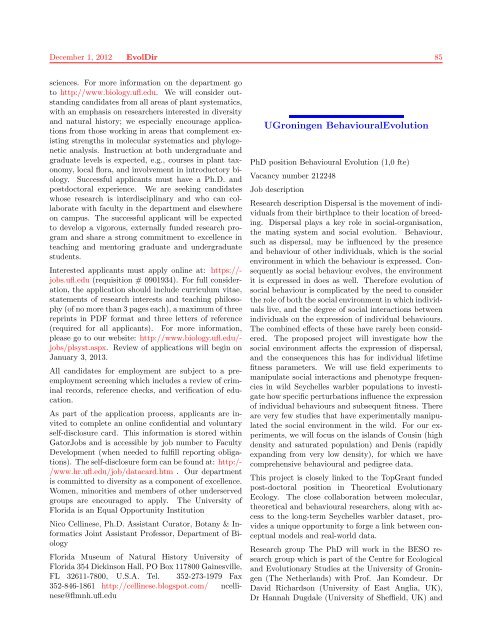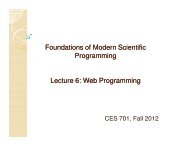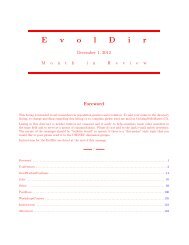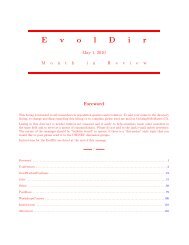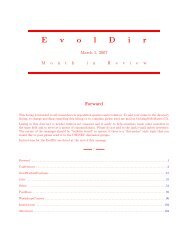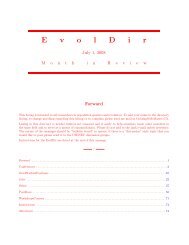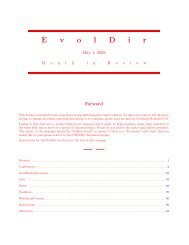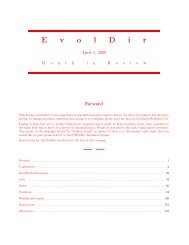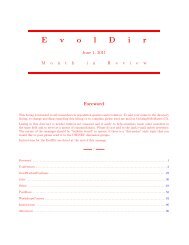E v o l D i r
E v o l D i r
E v o l D i r
You also want an ePaper? Increase the reach of your titles
YUMPU automatically turns print PDFs into web optimized ePapers that Google loves.
December 1, 2012 EvolDir 85<br />
sciences. For more information on the department go<br />
to http://www.biology.ufl.edu. We will consider outstanding<br />
candidates from all areas of plant systematics,<br />
with an emphasis on researchers interested in diversity<br />
and natural history; we especially encourage applications<br />
from those working in areas that complement existing<br />
strengths in molecular systematics and phylogenetic<br />
analysis. Instruction at both undergraduate and<br />
graduate levels is expected, e.g., courses in plant taxonomy,<br />
local flora, and involvement in introductory biology.<br />
Successful applicants must have a Ph.D. and<br />
postdoctoral experience. We are seeking candidates<br />
whose research is interdisciplinary and who can collaborate<br />
with faculty in the department and elsewhere<br />
on campus. The successful applicant will be expected<br />
to develop a vigorous, externally funded research program<br />
and share a strong commitment to excellence in<br />
teaching and mentoring graduate and undergraduate<br />
students.<br />
Interested applicants must apply online at: https://jobs.ufl.edu<br />
(requisition # 0901934). For full consideration,<br />
the application should include curriculum vitae,<br />
statements of research interests and teaching philosophy<br />
(of no more than 3 pages each), a maximum of three<br />
reprints in PDF format and three letters of reference<br />
(required for all applicants). For more information,<br />
please go to our website: http://www.biology.ufl.edu/jobs/plsyst.aspx.<br />
Review of applications will begin on<br />
January 3, 2013.<br />
All candidates for employment are subject to a preemployment<br />
screening which includes a review of criminal<br />
records, reference checks, and verification of education.<br />
As part of the application process, applicants are invited<br />
to complete an online confidential and voluntary<br />
self-disclosure card. This information is stored within<br />
GatorJobs and is accessible by job number to Faculty<br />
Development (when needed to fulfill reporting obligations).<br />
The self-disclosure form can be found at: http:/-<br />
/www.hr.ufl.edu/job/datacard.htm . Our department<br />
is committed to diversity as a component of excellence.<br />
Women, minorities and members of other underserved<br />
groups are encouraged to apply. The University of<br />
Florida is an Equal Opportunity Institution<br />
Nico Cellinese, Ph.D. Assistant Curator, Botany & Informatics<br />
Joint Assistant Professor, Department of Biology<br />
Florida Museum of Natural History University of<br />
Florida 354 Dickinson Hall, PO Box 117800 Gainesville,<br />
FL 32611-7800, U.S.A. Tel. 352-273-1979 Fax<br />
352-846-1861 http://cellinese.blogspot.com/ ncellinese@flmnh.ufl.edu<br />
UGroningen BehaviouralEvolution<br />
PhD position Behavioural Evolution (1,0 fte)<br />
Vacancy number 212248<br />
Job description<br />
Research description Dispersal is the movement of individuals<br />
from their birthplace to their location of breeding.<br />
Dispersal plays a key role in social-organisation,<br />
the mating system and social evolution. Behaviour,<br />
such as dispersal, may be influenced by the presence<br />
and behaviour of other individuals, which is the social<br />
environment in which the behaviour is expressed. Consequently<br />
as social behaviour evolves, the environment<br />
it is expressed in does as well. Therefore evolution of<br />
social behaviour is complicated by the need to consider<br />
the role of both the social environment in which individuals<br />
live, and the degree of social interactions between<br />
individuals on the expression of individual behaviours.<br />
The combined effects of these have rarely been considered.<br />
The proposed project will investigate how the<br />
social environment affects the expression of dispersal,<br />
and the consequences this has for individual lifetime<br />
fitness parameters. We will use field experiments to<br />
manipulate social interactions and phenotype frequencies<br />
in wild Seychelles warbler populations to investigate<br />
how specific perturbations influence the expression<br />
of individual behaviours and subsequent fitness. There<br />
are very few studies that have experimentally manipulated<br />
the social environment in the wild. For our experiments,<br />
we will focus on the islands of Cousin (high<br />
density and saturated population) and Denis (rapidly<br />
expanding from very low density), for which we have<br />
comprehensive behavioural and pedigree data.<br />
This project is closely linked to the TopGrant funded<br />
post-doctoral position in Theoretical Evolutionary<br />
Ecology. The close collaboration between molecular,<br />
theoretical and behavioural researchers, along with access<br />
to the long-term Seychelles warbler dataset, provides<br />
a unique opportunity to forge a link between conceptual<br />
models and real-world data.<br />
Research group The PhD will work in the BESO research<br />
group which is part of the Centre for Ecological<br />
and Evolutionary Studies at the University of Groningen<br />
(The Netherlands) with Prof. Jan Komdeur. Dr<br />
David Richardson (University of East Anglia, UK),<br />
Dr Hannah Dugdale (University of Sheffield, UK) and


